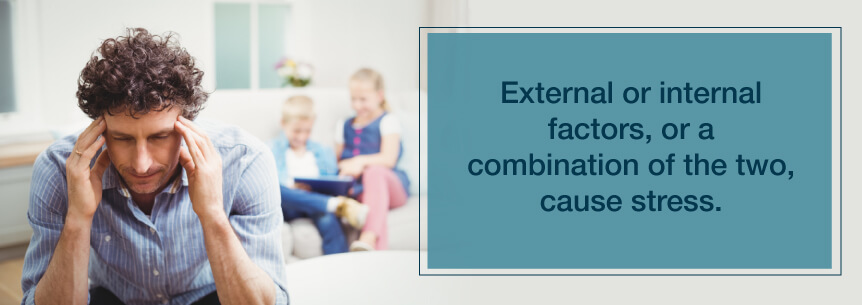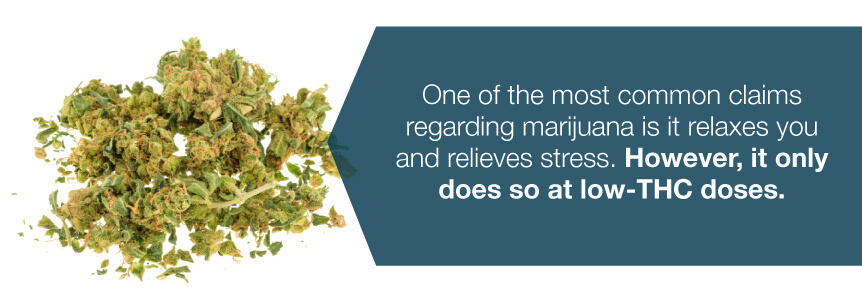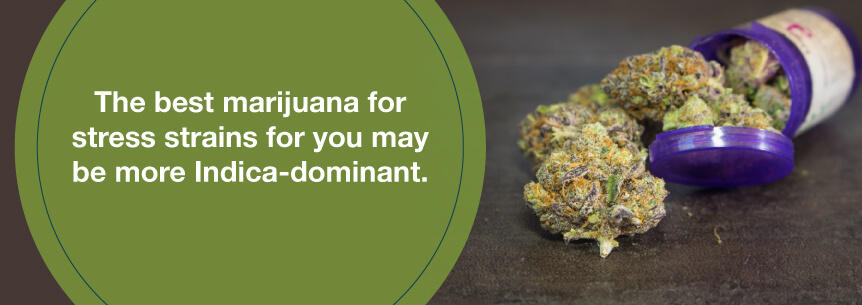
In small doses, stress can help you rise to the occasion, accomplish goals and do your best work. When stress becomes a daily occurrence, though, it could land you in the doctor’s office or emergency room. Continue reading to learn more about this ailment and the steps — including considering medical marijuana for stress — you can take to reduce its negative impact on your life.
The National Institute of Mental Health (NIMH) describes stress as your body and brain’s response to any demand. Everyone experiences stress at some level, and it isn’t always a negative thing. However, long-term stress can have serious health consequences.
Fortunately, there are things you can do to manage stress and reduce its effects on you. Learning how to recognize stress when it’s becoming a problem is key to avoiding some of the worst health consequences it causes.
Stress manifests individually in each person, and in many ways. Different people may display various signs or symptoms of stress. The symptoms listed below are some of the more common signs of stress.
You may experience a few of these symptoms, or many of them, depending on the causes of your stress and how it plays out in your life. For most people, stress manifests in one or more of the following ways:
When you feel as though you’re becoming overwhelmed by stress or its symptoms, it’s time to either make some changes in lifestyle and behavior, learn a few stress management and coping techniques or seek professional help. These all can help you get your stress under control before it begins to have a negative impact on your health.
External or internal factors, or a combination of the two, cause stress. Some stressors could exist beyond your control — at least to some degree. Your unique stress factors can relate to any of the following:

You can’t always make changes to eliminate your stressors. You can only control how you react to them.
Other types of stress may be more internal. They include things like:
For most adults, certain activities tend to cause more stress than others. Among the top five, according to Help Guide as compiled by the Holmes and Rahe Stress Scale, are:
Because everyone handles stress differently and carries different stress loads, there is no one defining moment when stress becomes too much, and everyone needs to get help. For the most part, you need to seek help whenever you feel like stress has become a long-term issue affecting how you function at home, at work and in your relationships. Ideally, you’ll seek help before it gets to that point, so you can avoid some of the physical and emotional health fallout occurring as a result of too much stress in your life.
You can experience one or more of these three common types of stress.
Acute stress is the most common form of stress, according to the American Psychiatric Association. In small doses, this type of pressure can be thrilling and exciting. Acute stress is usually short-term and doesn’t have lasting effects on your health. It may cause the following symptoms:
Acute stress is also very manageable and easy to recognize.
People who are in a rush, late, disorganized or confronted with chaos may subject themselves to episodic acute stress. These are the people who can’t seem to say no when asked to take on one more task, and other things in their lives suffer as a result.
With episodic acute stress, you’re in a constant state of crisis or panic — and you may not even know it. It’s your norm, so you accept it and assume life works that way for everyone.
Long-lasting stress spikes can take a toll on your health, leading to coronary heart disease, migraines, hypertension, chest pain and tension headaches. Treating this kind of stress often requires long-term and dedicated professional help — especially since people who experience it rarely feel like they have problems and are often reluctant to change, notes the American Psychological Association.
This is the type of stress occurring when people feel locked into would-be hopeless situations. Poverty, social circumstances, feeling trapped in a bad relationship or even stuck in a dead-end job can bring on feelings of stress. People with chronic stress may become victims of:

One alarming aspect of chronic stress is some people don’t even realize it’s there. Stress has been a constant companion for so long, those who have it don’t even recognize it.
Though people have undoubtedly experienced stress since the dawn of human history, defining and documenting stress is a relatively new concept in science. The first use of the word “stress” in modern terms is often incorrectly credited to Dr. Hans Selye in 1936. It was, in fact, Walter Cannon who coined the term in his work on flight-or-flight responses in 1932.
Today, health care providers may overuse the word to the point it has lost some of its medical impacts. However, stress remains a medical emergency when experienced in large doses, or a long-term health concern if people experience high levels of stress over longer periods.
CBS News recently reported 8.6 million adults — more than ever before — are suffering from stress and other psychological distress and feel they are unable to get help for their conditions.
Unfortunately, children experience stress too, reports The American Psychological Association, which states nearly one-third of children revealed stress-associated physical symptoms within the last month.
Stress can impact your body and emotions. Let’s take a look at both.
Stress can have a significant effect on your body, both in the short term and long term.
In the short term, stress can cause:
Long-term stress can affect your:
Stress can make you feel:
Unfortunately, most treatments for physical or mental pressure involve stress management. Behavioral changes are the most effective responses to stress to deliver lasting results. Try these things and see if they help you manage your stress better and improve your mental and physical health.
If you’ve tried all these things and are still experiencing the adverse effects of stress in your life, consider professional counseling. Long-term therapy can help you identify potential triggers, so you can stop stress before it happens. Counseling may include:
Your doctor may also prescribe medications to relieve your anxiety, insomnia or depression. And medical cannabis can help with these also, as you’ll learn below.
When it comes to stress, finding a way to calm down and relax when you feel overwhelmed with anxiety is essential. Some people turn to alcohol as a way of finding relief, while others rely on prescription medications. These solutions to eliminate your stress, however, are only temporary fixes and can leave you exposed to overconsumption and addiction. Medical marijuana for stress offers you a non-harmful, non-addictive alternative to find relief when you’re having a difficult time.

One of the most common claims regarding marijuana is it relaxes you and relieves stress. However, you should be aware it only does so at low-THC doses, according to a recent study published in a journal called Drug and Alcohol Dependence. Findings of the study, conducted by researchers at the University of Chicago and the University of Illinois at Chicago, support the claim cannabis relieves tension, stress and anxiety.
The participants in the study who received higher doses of THC reported some increase in negative mood and anxiety, which supports the idea cannabis might also cause an opposite effect.
The physical symptoms medical cannabis for stress can relieve include:
Emotional symptoms it can relieve include:
Anxiety and depression can set in easily with prolonged exposure to stress and constant pressure. Although a chemical brain imbalance can cause depression, a rigorous daily workload can also cultivate it.
Cannabis has certain compounds, CBD and THC, which mirror your endocannabinoid system’s chemical responses. These compounds replace your endocannabinoid system’s missing chemicals and act as a mood stabilizer, essentially erasing your depression.
A McGill University 2007 study shows THC works as an anti-depressant in low doses. In the study, researchers gave “depressed” mice THC. The THC increased their serotonin levels in the same way selective serotonin reuptake inhibitors would.
Another reason users turn to cannabis is to relieve their anxiety. Scientists are now beginning to uncover evidence cannabis could be very useful in treating anxiety disorders. Regular cannabis users report the herb relaxes them, relieves their stress and reduces their anxiety.
With medical weed evolving over the years, new strains are popping up all the time — many specifically for treating stress. The best marijuana for stress strains for you may be more Indica-dominant. Some other varieties may also help. It’s best to speak to an experienced budtender at a cannabis dispensary or work with your medical marijuana doctor to point you in the right direction in choosing a strain for stress.

Below are five strains to help reduce stress and other symptoms effectively.
Get your cannabis and stress treatment in various delivery methods.
Now that you’ve become educated on marijuana and stress treatment, you’ll need to consult with a doctor for a recommendation. If your primary care physician is not a qualified marijuana doctor, it could be a challenge getting them to provide a recommendation, since they may not be as up-to-date on medical cannabis.
Here at MarijuanaDoctors.com, we’ll be happy to help you find a doctor, get a list of medical marijuana dispensaries and answer any questions you have. Contact us today to get started with your medical cannabis treatment.
Find A Doctor Find A Dispensary